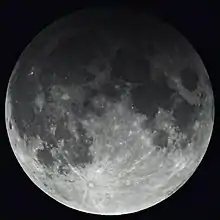| Penumbral Lunar Eclipse 7 July 2009 | |
|---|---|
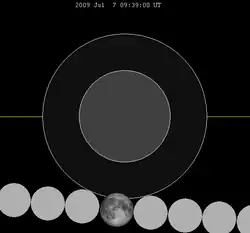 The Moon grazed the southern penumbral shadow of the Earth. | |
| Series (and member) | 110 (71 of 72) |
| Gamma | -1.4915 |
| Magnitude | 0.1562 |
| Duration (hr:mn:sc) | |
| Penumbral | 2:01:29 |
| Contacts (UTC) | |
| P1 | 8:37:51 |
| Greatest | 9:38:36 |
| P4 | 10:39:20 |
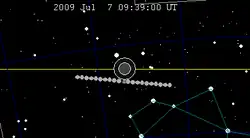 This lunar eclipse grazes the southern edge of the Earth's penumbral shadow occurs at the ascending node of the Moon's orbit, in the constellation of Sagittarius | |
A penumbral lunar eclipse took place on 7 July 2009, the second of four lunar eclipses in 2009. This eclipse entered only the southernmost tip of the penumbral shadow and thus was predicted to be very difficult to observe visually.[1] This lunar eclipse was the predecessor of the solar eclipse of 22 July 2009.
Eclipse season
This is the first eclipse this season.
Second eclipse this season: 22 July 2009 Total Solar Eclipse
Third eclipse this season: 6 August 2009 Penumbral Lunar Eclipse
Visibility
It was predicted to be seen rising over Australia after dusk on 7 July and setting over western North and South America in the early predawn hours of 7 July.
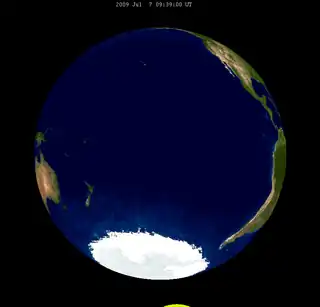
Map

Related lunar eclipses
Eclipses of 2009
- An annular solar eclipse on 26 January.
- A penumbral lunar eclipse on 9 February.
- A penumbral lunar eclipse on 7 July.
- A total solar eclipse on 22 July.
- A penumbral lunar eclipse on 6 August.
- A partial lunar eclipse on 31 December.
Lunar year (354 days)
This eclipse is one of five lunar eclipses in a short-lived series. The lunar year series repeats after 12 lunations or 354 days (Shifting back about 10 days in sequential years). Because of the date shift, the Earth's shadow will be about 11 degrees west in sequential events.
| Lunar eclipse series sets from 2009–2013 | ||||||||
|---|---|---|---|---|---|---|---|---|
| Ascending node | Descending node | |||||||
| Saros # Photo |
Date Viewing |
Type chart |
Gamma | Saros # Photo |
Date Viewing |
Type chart |
Gamma | |
| 110 | 2009 Jul 07 |
penumbral |
−1.4916 | 115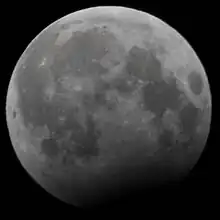 |
2009 Dec 31 |
partial |
0.9766 | |
120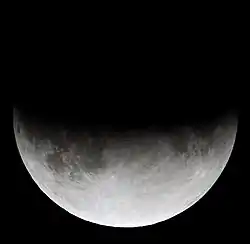 |
2010 Jun 26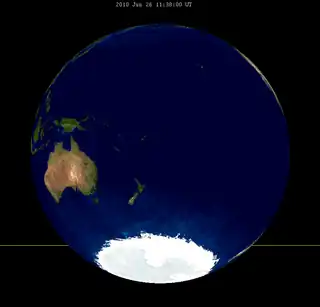 |
partial |
−0.7091 | 125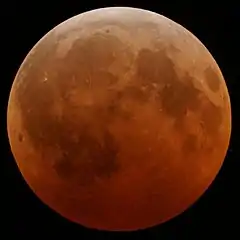 |
2010 Dec 21 |
total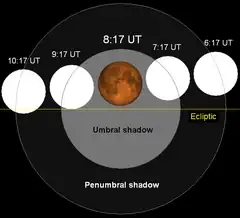 |
0.3214 | |
130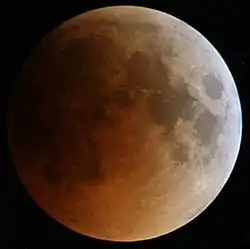 |
2011 Jun 15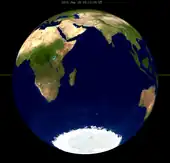 |
total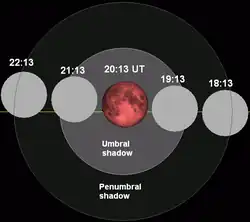 |
0.0897 | 135 |
2011 Dec 10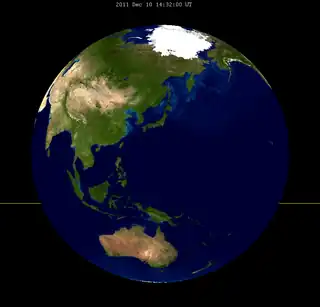 |
total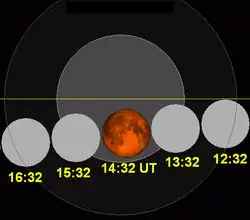 |
−0.3882 | |
140 |
2012 Jun 04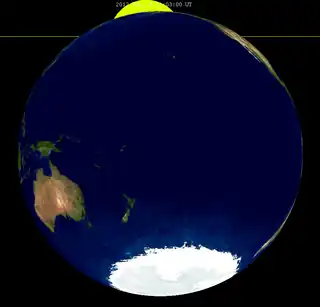 |
partial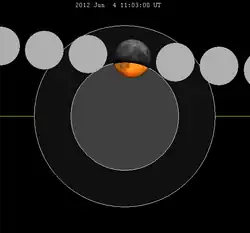 |
0.8248 | 145 | 2012 Nov 28 |
penumbral |
−1.0869 | |
| 150 | 2013 May 25 |
penumbral |
1.5351 | |||||
| Last set | 2009 Aug 06 | Last set | 2009 Feb 9 | |||||
| Next set | 2013 Apr 25 | Next set | 2013 Oct 18 | |||||
Saros series
This eclipse is a member of Saros series 110. The previous event occurred on 27 June 1991. The next event is on 18 July 2027 which will end the series.
Half-Saros cycle
A lunar eclipse will be preceded and followed by solar eclipses by 9 years and 5.5 days (a half saros).[2] This lunar eclipse is related to two partial solar eclipses of Solar Saros 117.
| 1 July 2000 | 13 July 2018 |
|---|---|
 |
 |
See also
- List of lunar eclipses and List of 21st-century lunar eclipses
- File:2009-07-07 Lunar Eclipse Sketch.gif Chart
Notes
- ↑ Sky&Telescope: "The moon skims through too little of the penumbra to be noticed even by the most intent observer." Archived February 2, 2009, at archive.today
- ↑ Mathematical Astronomy Morsels, Jean Meeus, p.110, Chapter 18, The half-saros
External links
- 2009 Jul 07 chart: Eclipse Predictions by Fred Espenak, NASA/GSFC
- Penumbral Eclipse of the Moon: 2009 July 07 Archived July 1, 2010, at the Wayback Machine
- Eclipses During 2009
- http://www.shadowandsubstance.com/
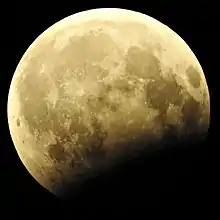
_(cropped).jpg.webp)
